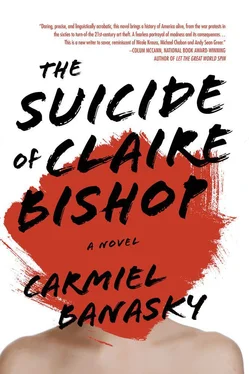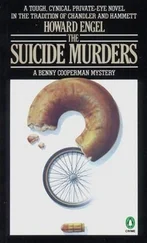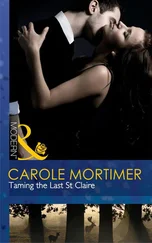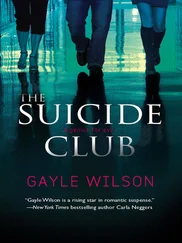“I did, no thanks to the cashier,” Dan says. “They ought to have IQ tests for these types of jobs. A black man with this Afro-type beard. Avoid that one next time you go in there.”
“That’s racist,” I say.
“Being specific does not make me racist,” Dan says. “I’ve come across plenty of idiotic white cashiers in my day. More idiotic, in fact.”
“Jews and blacks hate each other,” I tell Jules.
“Only Long Island Jews,” says Dan.
“West wants to know if he can stay here a bit and watch TV,” Jules says.
Dan coughs. “We’re getting home kind of late…”
“I’ll be gone by the time you’re back,” I say sweetly.
Dan grunts a begrudging approval. Not that he should care. It won’t affect them unless I eat their food.
“Help yourself to the fridge,” Jules says.
Did I project that thought by accident? But I know I didn’t, because projecting thoughts is not a thing. Being around Dan, I slip sometimes. He has this way of sucking away my power from the inside out with an invisible straw. Whatever Jules is hiding, Dan is behind it.
He leans down, not touching Jules in front of me, and whisper-mumbles something. Jules nods and says, “But not the whitefish salad. That’s for Dan’s lunch tomorrow. The front door locks when you close it, but check to make sure. And, West?”
The strands of her wig wave toward me in snaky smiles. I glare at her. I know what she’s about to say.
“Call Mom? She’s worried, like always. It won’t kill you to talk to her.”
“It might,” I say. Jules never tells me to call our dad.
“We can have dinner for real sometime if you call me, too.”
“He’s a grown man,” Dan mutters as they head out the door.
“I will,” I say. “How are you anyway?” But they’re already gone. I always miss the closing of doors.
The light echoing against the sleek brown of their furniture makes me nervous and I turn the dimmer down. I’ve never been here alone before. It’s like the parents have just left and I’m the babysitter, but there are no babies. Mom is always bugging everyone, me included, about if and when she’ll get to be a grandmother. Jules won’t talk about not having babies yet, but I’m glad they haven’t.
No new text messages or voicemails. Not a peep from Nicolette.
Just in case they come back in to check, I flip to the middle of a sitcom about doctors. The laugh track doesn’t make sense when it happens, like they made a mistake at the studio — but I know it’s just me. I waddle around the perimeter of the room looking for clues. The sound of my feet swishing on the wood gets mixed up in the low volume of the TV. Canned laughter coming from my shoes.
The only framed photos in the room are wedding pictures, as if Dan and Jules had no lives before they met each other. As if they’ve had nothing to take pictures of since. There’s one of me between them, smiling sideways, my suit a little too big.
When Jules told me they were engaged, I told her, “You can’t marry Dan, you don’t even believe in God.” And she said, “I believe in Dan, and I will grow to believe in God.” You can’t grow into belief, I insisted. But I was wrong. Now she believes. “Where’d you find God?” I once asked meanly. “In the laundry hamper?” It’s something Nicolette might have put into my head to say. But Jules only touched my forehead like I had a fever and said, “You’ll never understand, will you?”
What I want to know is why doctors never diagnose religious people as delusional.
We aren’t even really Jewish. My great-grandmother was a forced convert during the Pogroms, so my grandma was raised Catholic, my mom in turn, and Jules and I were raised some version of fundamentalist-atheism. So you might say Jules felt it was on her to make up for this forced loss of faith, identity. Once she learned about it, it took over her life. It was all she read about and talked about. She got the paperwork to prove she was really Jewish. She is what my great-grandmother could never be. She became the thing we lost.
Some people might call that overcompensation, but you didn’t hear it from me.
There was even something different in the way Jules smelled tonight. But there’s always a clue in the things people buy. It doesn’t count as snooping since Dan left the plastic bag by the door, the contents nearly tipping out anyway. I nudge it open a little more with my foot and peek in: scent-free lotion, scent-free soap, hand sanitizers, a king-size bag of cotton balls, magnesium and calcium supplements, and a box of cinnamon hard candies. I smash the bag of cotton balls against my head.
It can’t be true.
I bet you’re thinking a couple items from the pharmacy aren’t enough to prove Jules is what I think she is. Well, if you don’t believe me yet, there are bound to be two more clues lying around here. Clues come in threes. Always.
There’s a stack of ads and bills on the coffee table, but one person’s junk mail is another’s evidence. And just as I suspected, next to ads for an umbrella and a portable power tool set, there’s clue #2: an ad for a white noise machine and electrical outlet safety guards — all intended, nay, calculated, for Jules. These companies don’t want you to know how much they know. They’re just as good at spying on you as pretending they’re not. They slip in ads that seem random and unrelated, making you think everyone in the building got the same coupons. Think again, buster. They’re running your purchases through statistical algorithms. They’ve got you pinned down to the week. Sometimes they know before you do.
In their bedroom, the laundry basket is clean of clues. The only outof-place item is inside the top drawer of the dresser — lacy underwear! — I hide it from myself quickly. On Dan’s nightstand are piles of spreadsheets and papers that look familiar, from the same database I use at work. On the wall is a photograph of a rabbi. Rabbi Menachem Schneerson — Dan has told me about him a dozen times. This photograph in place of a mirror, Dan says: “To reflect back my potential instead of the nincompoop I am!”
I throw myself on their bed and lie on my stomach, curling myself over so I can see into the dark underneath. The blood rushes to my eyes. Upside down, I rummage under the bed for more clues. Beside stacks of photo albums and an old tattered briefcase, there’s a tin box. Right-side up, I set it gently on my lap and lift the lid. Inside is something dark and dead. No, not a rat, don’t be gross. It’s a piece of hair.
I cried when Jules cut her hair so short. I loved her hair. I miss her hair. I was mean to her hair once, but that’s a truth for another time. It was thick and molasses-colored and sometimes stuck up all over the place enough to make her scream that she hated herself. When she cut it I was there and picked up a piece from the floor, and I tucked a lock of it into my pocket. I didn’t know she’d done the same, saved a lock for herself. I still carry mine around in my wallet. It’s old and knotted now, like a dreadlock.
But that’s not the third clue. Without it, there’s still a chance I’m wrong about Jules. The bathroom is immaculate; I can almost see my face in their floor tiles, though my glasses slide down my nose when I peer into them. I don’t look at myself in the mirror while I sift through razor attachments and make-up removers.
Finally, on top of the toilet tank, is the mother of all clues, excuse the pun: a book called, Nine Jewish Months: How to Keep Gestation Holy — a Halachic Guide to Pregnancy .
My sister is pregnant.
And she didn’t tell me.
Did you know I would brush her hair when we were growing up, and she’d know exactly what that meant — Mom wasn’t coming home that night from one of her animal-rights protests — but at least Jules would get something good out of it. Except for that one time when I was mean to her hair. Which I never apologized for. And I can’t say it yet.
Читать дальше












